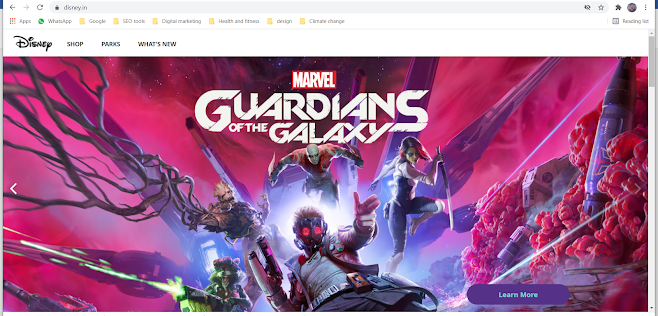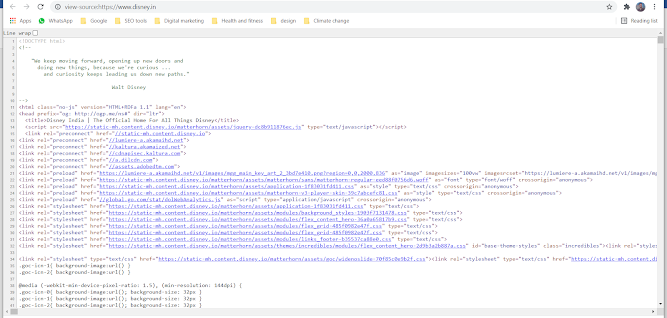 |
| Image courtesy: Canva.com |
Today, I received an email from Canva.com (the online design website) regarding an online two-day design class that’s going to happen soon. I clicked to register for it.
The timings
for the sessions were mentioned in the EST (Eastern Time Zone). I quickly, (and
almost subconsciously) searched on Google ‘EST to IST (Indian Standard Time)
converter’ to see when the session is in my time zone so that I can schedule it
in my routine.
Later in
the day, I saw a meme on Instagram, which said, “Photo of the sexiest man alive….
and Paul Rudd.” I did not get the reference. I googled, “Sexiest man…” and got
an autosuggest by Google “Sexiest man alive 2021”. On the top of the results
page, I saw the news that read “Paul Rudd is named People’s Sexiest Man Alive
of 2021”.
What I am
trying to say is Searching or Googling has become an integral part of today’s
life. It is estimated that 3.8 million searches happen on Google per minute!
That is a whopping 5.4 billion per day! And it is growing every day.
Just like I
did, people search for solutions to the small daily problems that they
encounter, things that they want to buy, concepts that they are curious to know
about or places that they want to visit.
And to
cater for their needs, websites, blogs, news forums, online directories all
compete to show up first. How do they do it? Here is when Search Engine
Optimizers (SEOs) come to the rescue. Now, a bunch of questions arise. What do
SEOs do? Or What exactly is SEO? And why is SEO important to businesses?
Let us find out!
What is SEO (Search Engine Optimization)?
Before
diving into the question, let us understand the Search Engines a bit, where we
go with our problems and search all the time.
Search
Engines are not humans. They do not see the catchy and vibrant images or fonts
that humans see on the internet.
For
example, see this screenshot from the Disney India website. This is what humans
see.
While this is what search engines see, unfortunately :p.
So, again,
what is SEO? Search Engine Optimization is the process of optimizing the
website/blog in a way that it is easy for Search Engines to read and index(to
store) web pages on their servers and rank you optimally every time someone
searches for something that your website offers.
It is all
the work that you do on your website and also, beyond your website that helps
Search engines find you more relevant and useful enough to rank your website
higher which leads to more views, more leads or more sales! Well, that is what it
is for in the end!
What do Search Engine Optimizers(SEOs) do?
Search Engine optimization includes several tasks to be done. Search Engine Optimizers (SEOs) offer the required knowledge and skills to do the job.
How to do SEO?
SEO is a series of steps to be followed. Follow along!
Keyword Research
As
businesses/bloggers, we should know what people search for so that we can
optimize our websites accordingly.
The first
and the most important task in search engine optimization is finding those
keywords or better known as keyword research.
For example, you have a website that sells second-hand clothes. We need to find what customers in your target location search for. When they intend to buy second-hand coats, do they search ‘Second-hand coats’ or ‘used coats’ or ‘hand me down coats’ or ‘pre loved coats’?
For a
successful SEO, it is not safe to assume what you know about a product or service
is what everyone knows. We need to try our hands-on keyword research to find
how do other people search for it.
Although
the search engines are becoming smarter every day and the artificial
intelligence that backs them nowadays estimates the searcher’s intentions adequately.
It knows when someone wants an Apple iPhone and when they want Apple fruit when
they search for Apple-related queries.
Results for 'buy apple'
Having said
that, keyword research and optimization of the website with the right keywords
is and always will be important. This is because, even if with the advancement
of technologies, one thing will stay, people will search using ‘queries’ (no
matter they write it or search using voice search features) and websites will
contain those ‘keywords’ for search engines to know what this website is all
about.
Google Keyword Planner of Google Ads is the first tool you should go for to find out ideas for
keywords that people actually search. It also shows you how many people in your
selected location/region/country search for a keyword. There are other paid
tools as well to further analyze how many competitors are already using a
keyword for their website optimization.
The goal is
to find the right mix of keywords for your website/blog which has a high to medium
number of searches and a medium to low keyword difficulty (more competitors,
more difficult it is to rank for a keyword).
On-Page Search Engine Optimization (On-Page SEO)
There are
two basic SEO stages. On-page optimization; what we do on our website and
off-page optimization is what we do beyond our website.
No one can
precisely tell which stage matters more or what percentage of the total SEO
efforts, these individual stages hold importance.
But, there
is no doubt that both of them are critical to your search rankings.
Basically, SEO is determined by three things;
- Unique and useful content;
- Optimization for the search engines; and,
- The popularity of the website.
Gone are
the days when search engines were not smart enough and it was extremely easy to
rank for a keyword by just stuffing it on the web pages compromising the
natural language flow of the content.
On-page optimization includes providing relevant information/service, placing the primary and secondary keywords in the right places;
- Title;
- Description;
- URL;
- Headings;
- Image descriptions and,
- The body content.
Apart from
keyword placement, it also includes links.
Among numerous ways, search engines come to know about web pages on the internet is through links. For example, I will link this blog article to other descriptive articles which I will write and post soon, explaining Keyword research, On-page SEO checklist and off-page optimization in detail and link this article back from those articles.
Links, on
one hand, transfer traffic from one webpage of a website to another webpage of
the same website, on the other hand, it also helps Google bots (the software
programs that read websites on the world wide web/ search engines) find
different pages.
Off-Page Search Engine Optimization (Off-Page SEO)
It is said that Google considers more than 200 factors to determine rankings of a search result against a query. It is hard to know and follow all those factors (perhaps, many few would know what exactly all those 200 factors are).
But, it is
critical to know the basics and follow those. As I wrote about the three things
that majorly decide rankings- ‘Useful content’, ‘Optimization’ and
‘Popularity’.
Gaining
popularity for your website is the one that is not completely in your hands.
Let’s find out how it works.
·
Use
your offline relationships:
Whatever it is, starting something of your own, you should always leverage your social and professional circle to give you a head start. The majority of the customers find it hard to be the first ones to try something new, to pay a business they don’t trust yet.
So, ask your friends and family or colleagues
to check your website/blogs so that your website gets traffic and people spend
some time on it. If they recommend it, nothing like it!
· Getting Links from other websites:
Links are a great hint to the search engines, that your website offers valuable information, as other websites are linking to it.
This is not as easy as it sounds. It is
difficult to get links and more difficult to get high-quality links (links from older and popular websites, also called high authority websites).
Online, you might get strategies for social
bookmarking (Sharing your links on social media). But, with time, these strategies matter less.
Having said that, I am not saying social
bookmarking is not at all useful. Sharing your links over social media brings
some organic traffic to your website and spreads the word, but it is not
correct to expect an increase in rankings on the search engines.
Some strategies to get backlinks from other
websites is guest posting, getting
reviews on the review sites etc.
·
Create.
Good. Content.:
Do you think websites like Wikipedia or Investopedia or Amazon ask people for links? No, right! They offer really good content/services or products. They automatically get backlinks from other websites. Just like I linked the word ‘Wikipedia’ in here, I know I am not linking some random site for my visitors.
Creating good content is so necessary for the
image that is made in the online and offline world.
Why is SEO important to businesses?
What do businesses want? Any online business out there wants one or all of the three main objectives; Traffic, Leads and Sales.
·
SEO helps achieve business
objectives:
A website like Myntra.com would
want more sales, SBI life
insurance would want more leads through an embedded form on the
website and blogsites like Investopedia would want more traffic to earn more
money through AdSense or Subscription (EconomicTimes for
instance.
Now, how will they accomplish their business objectives?
By being there when people search for them and create a brand-loyal audience.
Almost 57 per cent of people search for brand reviews before making a purchase.
Search provides them with wider research opportunities than any other
platform.
They might not want to know what a review site says about a brand, but what all
review websites want. And who better than Google would tell them that!
Now, what after you have made a website for your business? Now it is
important to rank on the first page.
Ask yourself, how often do you go to the second page of the Google
Search Page?
Very few would nod in agreement. It is said in the SEO industry, that
"the best place to hide dead bodies is the second page of Google. Why?
Because no one goes there!"
Most searchers, if they do not get what they want on the first page,
change their search query instead of going to the second page.
About 70 per cent of the clicks happen on the first page of the search results page, while the first 5 results get about 67% of all clicks.
·
Search Engine Optimization
provides the second-best ROI (Return on investment):
After email marketing, Search Engine Optimization provides the best
Return on investment, according to the eConsultancy survey. Also, there is a
54% higher than average customer lifetime value, which means customers who
reached you through search are estimated to stay loyal to your brand 54% more
than the ones through other sources.
While doing keyword research, a question that I saw the most was, “Is
SEO relevant in 2021?”
I would conclude this article by giving my opinion on the above question.
Yes, It is relevant in 2021. And it will be relevant until we have curiosities in our minds, problems and needs of our daily lives; until we have businesses out there trying to answer or sell the solutions to those problems; and until mega search engines like Google exist, which stands guarding the gateway to the world wide web!
Click to learn how Digital marketing is different from traditional ways of marketing!
If you want to learn the basics of digital marketing, then know how Google can help you.
If you have any questions, feel free to drop them in the comments below or reach me out through the contact us form embedded in the sidebar.
A friend might need this information, share it.
You think I should improve somewhere; you can mention that in the comments too.
I am Pawan! Thank you for reading!










0 Comments